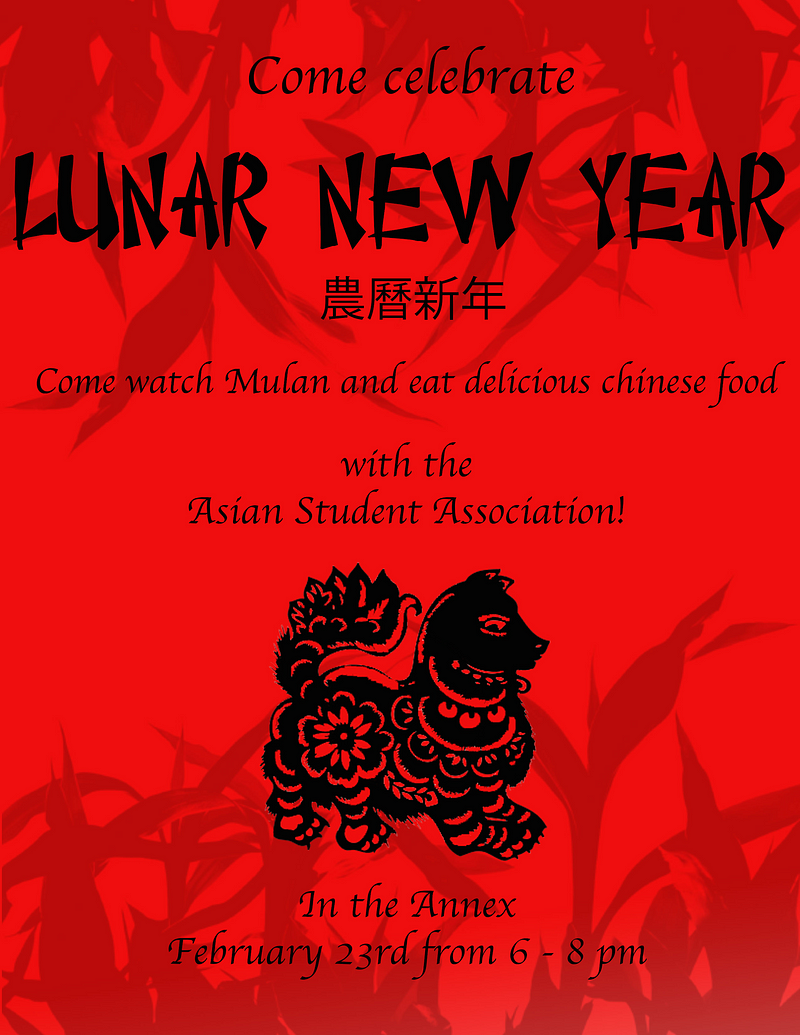
This Friday, Feb. 23, the Asian Students Association (ASA) will hold a Lunar New Year celebration. The celebration will take place from 6–8 P.M. in the Annex, and will include festive food and a viewing of the movie Mulan. The event is meant to symbolize the large family gaterings that occur in Chinese families during the Lunar New Year. The event will celebrate Lunar New Year, which occurred this year on Feb. 16.
The Lunar New Year is one of the world most prominent and celebrated holidays, and is heavily celebrated both inside and outside of China. The origins of the New Year festival are associated with different founding myths and origins stories. The holiday has been used as time to celebrate ancestors. The celebration of Lunar New Year has gained more recognition in the United States over the past several years, and in 2016, New York City Department of Education public schools recieved the day off, due to the number of students who were not attending so that they could family celebrations. The first Chinese New Year event held in the United States was held in San Fransisco in 1858, where the Chinese poplation was expanding rapidly due to the Gold Rush. Named the “San Francisco Chinese New Year Festival and Parade,” it remains the largest celebration of the Chinese New Year outside of Asia, just as San Fransisco remains one of the largest areas for Chinese-Americans to reside.
According to Jonathan Dong ’21, a member of the Asian Students Association, people celebrate Lunar New Year differently in different countries. All of the celebrations involve food, getting together with family, and honoring one’s ancestors. For this reason, ASA hosts a dinner where the campus can come together around a shared meal.
“As an Asian -American, this holiday holds a dear place in my heart, as this holiday drives people to come together and celebrate in honor of family, prosperity, fortune and overall happiness,” Dong said. “That being said, we at the Asian Student Association also want to use this event to bring everyone together and celebrate the community found on campus.”
Often, these celebrations serve many lucky foods, many of which will be served on Friday. According to Dong, the traditional foods served will include, “egg rolls, sweet and sour pork, vegetable fried rice, vegetable lo mein and dumplings.” While across China and the Chinese diaspora there is a wide variety in the foods enjoyed, vegetarian dumplings are universally favored. In additoin, members of the Chinese diaspora have added to the traditional foods eaten in China, often incorporating traditions from where they now live.
Many celebrations also involve the lucky color red. In some countries, people exchange red envelopes filled with money for the holiday. These envelopes are often specifically handed out to children. In China, there are also performances of a “Dragon “Dance” or “Lion Dance.” Many countries celebrate the occasion with fireworks and firecrackers, though recently that tradition has faded due to the danger associated with such activities. In addition, lanterns and flowers, often red and pink colored, are used to decorate homes and public spaces of those celebrating the holiday. This upcoming year on the Zodiac calendar is the Year of the Dog.
Within Asia, workers who live apart from their extended families often travel home to where their extended family is situated. Since the holiday is based off the Lunar calendar, the date varies from year to year, although it usually falls between January and February.
Many students look forward to this celebration, which has become an annual tradition at Hamilton. “It’s important to me because it’s part of my tradition and reflects a lot of the cultural values I grew up with,” Lilly Yangchen ’20 said. “In my culture we celebrate the Lunar New Year with our families and we come together as a family. I think it’s important for me to celebrate it here so I can have the same community at Hamilton.”

















